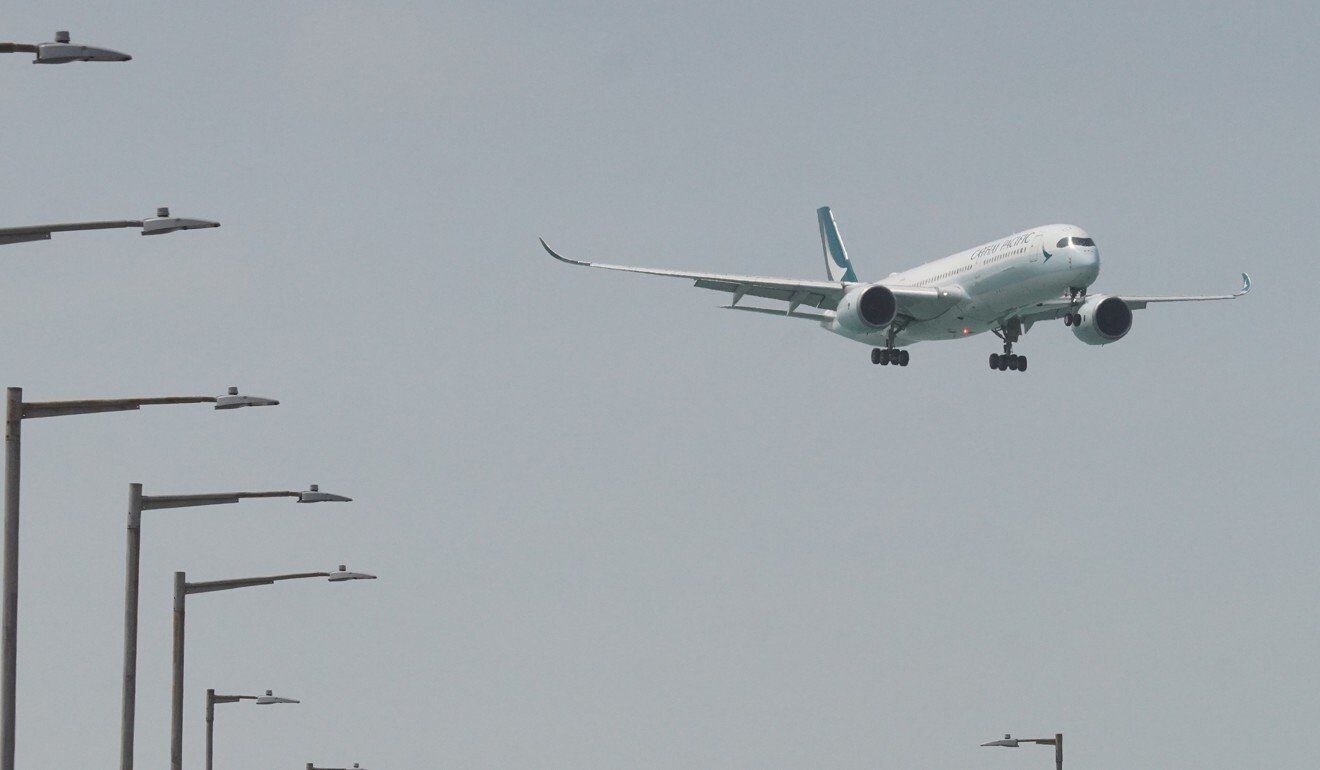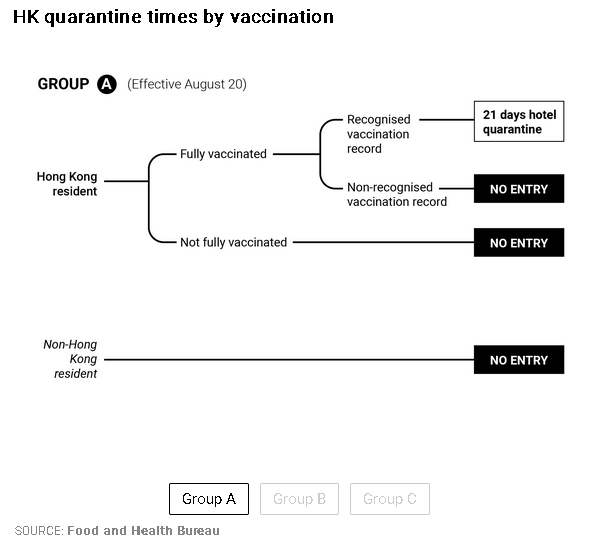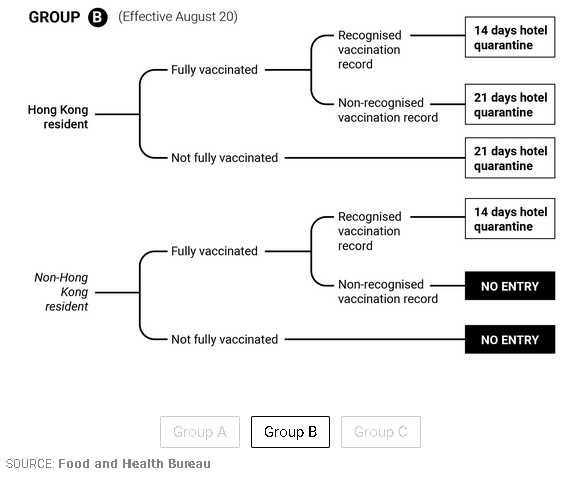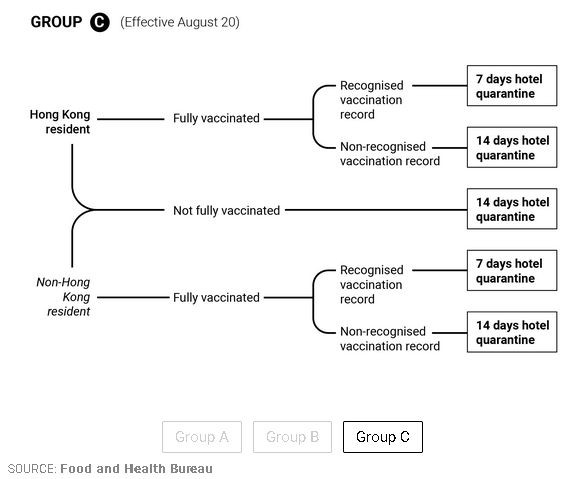
Hong Kong quarantine policy a threat to financial hub status: business chamber
European business leaders in Hong Kong have urged authorities to relax strict quarantine requirements for travellers who have been vaccinated against Covid-19, warning a recent rules tightening presents a threat to the city’s status as an international business hub.
The European Chamber of Commerce in Hong Kong’s push for a reopening to the outside world came just days after the government said it was elevating 15 countries to its “high-risk” category, meaning significantly tougher entry requirements and longer quarantine periods for anyone arriving from those destinations.
Countries moving from the medium to high-risk category on Friday are: the United States, France, Malaysia, Thailand, the United Arab Emirates, Bangladesh, Cambodia, Greece, Iran, the Netherlands, Spain, Sri Lanka, Switzerland, Tanzania and Turkey.
Australia will be vaulted from low to medium risk.
 Travel is already resuming in Europe and elsewhere, a top business group noted in a letter to the government.
Travel is already resuming in Europe and elsewhere, a top business group noted in a letter to the government.
The stricter system means travellers from the high-risk countries must be fully vaccinated for at least 14 days before boarding a flight to Hong Kong, then undergo 21 days of quarantine in a designated hotel upon arrival, with four Covid-19 tests during isolation and another on the 26th day after landing.
The tougher requirements followed the case of a domestic worker who had returned to Hong Kong from the US earlier this month. She was later determined to have become infected in a Wan Chai quarantine hotel by a couple staying across the hall who had been on the same flight.
In an open letter to Chief Executive Carrie Lam Cheng Yuet-ngor on Thursday, chairman Frederik Gollob said the business community had been grateful for the city’s recent attempt to relax quarantine measures for inbound travellers, calling it “a major step in the right direction”.
“However, the changes to the quarantine requirements announced on Monday present a significant setback,” Gollob said.
Many countries where the virus had recently surged had seen far fewer critical cases and deaths than last year because of their accelerated vaccination programmes, he said.
Their airports were open, and travel across Europe was resuming gradually. Vaccinated individuals could travel for private and business reasons to other destinations with no need for quarantine, he added.
Gollob went on to say that concerns raised by the Hong Kong government’s health advisers over isolated instances of positive coronavirus tests after quarantine were “out of proportion” and causing concern within the international community.



“We are of the view that Hong Kong must open itself sooner rather than later, or this new quarantine regime could lead many in the international community to question if they want to remain indefinitely trapped in Hong Kong when the rest of the world is moving on,” Gollob said.
The concerns undoubtedly posed a growing threat to the city’s international business centre status, he added.
The chairman urged the government to create and communicate a clear pandemic exit strategy that would take into account not only local health concerns, but also the overall mental well-being of the entire population, the children and elderly in particular.
Having a strategy in place would provide the basis for restoring confidence and enabling businesses to plan ahead, he explained, adding the city should also step up efforts to inoculate the remaining population and relax all quarantine measures for vaccinated visitors.
Early last month, Gollob was among several business leaders to say Hong Kong was in danger of falling behind as a global financial centre if it persisted with a “zero infections” approach and failed to produce a road map for quarantine-free travel.
He said he knew of at least four large businesses that already moved from the city because of the rules, and there was imminent danger of Hong Kong losing its edge over other jurisdictions such as Singapore.
Replying to a question from the Post, the Hong Kong General Chamber of Commerce said the tightening of quarantine rules would “definitely affect cross-border travel” and hoped they could be eased, worrying that the city might fall behind other countries.
“We must also bear in mind the changes in anti-pandemic strategies in other overseas destinations, like Singapore, which post a dilemma for Hong Kong as an international business hub,” its spokesman said.
It suggested the government “re-examine” its quarantine measures with the latest developments overseas in mind, adding that a higher inoculation rate was “a crucial step” in relaxing quarantine rules.
Willie Walsh, who leads the global airline body the International Air Transport Association, offered similar warnings in an interview with the Post late last month, before further travel and quarantine rules were issued.
“Countries or cities like Hong Kong who have effectively shut down, you know, people remember these decisions, will make future decisions based on their experience of what happens through this pandemic,” he said.
Walsh, director general and CEO of the IATA, which represents some 290 airlines, queried the Hong Kong government’s “zero-risk approach”.
“Why would you take the risk of investing in a country that’s likely to shut down again?” he said. “Are you prepared to invest in a business where it’s at greater risk of being trapped? These measures being taken today are influential in future investment decisions.”
Hong Kong has become increasingly at odds with its regional rival financial hub Singapore, which pushed ahead with an even greater reopening of its borders. Hong Kong, Macau and Germany were named on Thursday as the newest places for which Singapore would unilaterally remove the requirement for quarantine on arrival.











